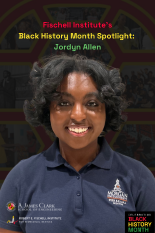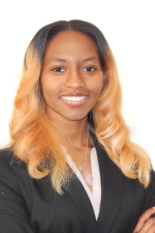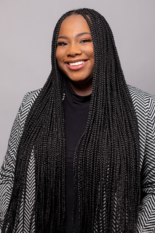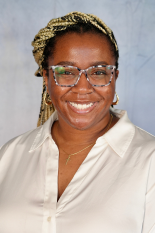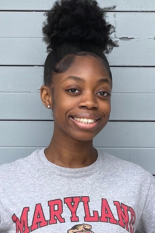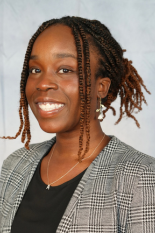News Story
Fischell Institute's Black History Month Spotlight: Briahnah Streeter
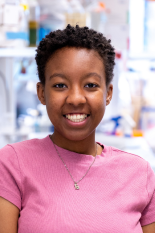
Briahnah Streeter is a second-year bioengineering Ph.D. student in Fischell Institute Director Bill Bentley's Biomolecular and Metabolic Engineering Laboratory. She earned her bachelor's degree in engineering science with a minor in engineering management from Vanderbilt University in 2022.
Streeter decided to attend the University of Maryland for her Ph.D. to explore research opportunities in bioengineering. Her current research focuses on integrating bacteria in gels to create platforms capable of sensing and responding to stimuli in their environment. She is working on a project that aims to use the bacteria to pick up environmental cues. In this project, she is creating gels that contain biosensing cells that can sense different molecules such as autoinducer 1 or pyocyanin, molecules produced by other bacteria. They have been engineered to respond to said molecules in multiple ways. The most common response is fluorescence.
Streeter is working to incorporate bacteria with different responses. She wants them to produce a product that interacts with the gel they are entrapped in. In this way, they respond to their environment by not only fluorescent indications but also by changing the nature of the gel they are entrapped in.
"What excites me most about my work is the creativity and trial and error. It feels great when you try something new, and it works," Streeter said.
Bentley’s lab, she said, has been a great place to pursue her research.
"My senior lab members are very kind and helpful,” said Streeter. “Being new to the lab, I still have a lot to learn, and it's nice having supportive lab mates who are willing to teach me."
Streeter advises those pursuing engineering degrees to understand that sometimes it feels like experiments fail more than they are successful. Therefore, students shouldn’t take the losses too hard.
"That doesn't deter me from loving engineering, but it helps to put things into perspective," she said. "You have all these ideas and hopes, but you must put in a lot of time and work to succeed. Success doesn't come overnight with research."
As a Black engineer, Streeter said her personal experience has given her a unique perspective on her career path. In addition, growing up as an older sister, she had to learn responsibility and discipline at a young age.
"I had to learn how to solve problems quickly and with as little damage as possible,” Streeter said. “This allowed me to develop a stubbornness that prevents me from giving up even when I feel something will fail. It helped me develop a drive to be successful no matter what because I was responsible for more than just myself. I think these traits carry over into my research as an engineer. Maybe not as vigorously, but they push me to keep asking questions and seeking answers because engineering is all about problem-solving."
Streeter is proud of herself for getting to this point. Her undergraduate years and first year of her Ph.D. were challenging.
"I have made it to year two and will soon be in my third year. I will be the first person in my family to get their doctorate, so I am especially proud that I am pushing myself to do so."
Streeter believes Black history should be remembered and celebrated throughout the year.
"Learning about our history is important, and it shouldn't be limited to one month," she said. "We often tend to focus on the same events and key figures, but learning shouldn't be limited to a few facts here and there. While it's good that people are using this month to learn more about Black culture and our history, they should also know how it shapes our present."
In the future, Streeter would like to work on designing and creating cell-based biomaterials or engineered living materials at a company. She is also interested in becoming a postdoctoral researcher at a biotech company or a hospital.
Outside of the lab, she enjoys puzzles, cooking, arts and crafts, and watching anime.
Published February 2, 2024

